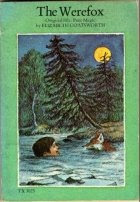84. Lewis & Clark by Nick Bertozzi
 Lewis & Clark by Nick Bertozzi (Canada) - (US)
Lewis & Clark by Nick Bertozzi (Canada) - (US)Pages: 138
Ages: 12+
Finished: Apr.2, 2011
First Published: Feb. 15, 2011
Publisher: First Second
Genre: biography, history, explorers, non-fiction
Rating: 4/5
First sentence:
Go awayyy...
Acquired: Received a review copy from First Second Books.
Reason for Reading: I enjoy Western history.
I've read a few books on Lewis & Clark before (children's books) and read many books on the expansion of the west where the Lewis & Clark story would take up a chapter so I am familiar with this story. This book is recommended for ages 12 and up but it isn't written down to a young audience, adults will enjoy it as much or more. The book of course tells the story of their epic journey from St. Louis to the Pacific Ocean, in search of a viable water route. That journey was fraught with accidents, bad luck, aggressive Indians, injuries and setbacks from nature itself. Bertozzi manages to tell a fine introductory tale of this expedition and these adventurers who were full of their success before they had even started.
Bertozzi also brings to life the personalities of Lewis and Clark in a way that I haven't encountered in my previous reading. Captain William Clark is shown as the level headed partner and thus is not the one that stands out. He is always reasoning with Lewis about there plans, calming him down, and putting out the flames of discord with others. He is shown as a quiet, intelligent, reasonable, respectful man who probably kept the expedition from becoming a mess, in more ways than one. Though he was willing to have as much fun as the next guy and went along easily enough with Lewis' more thrill-seeking adventures. On the other hand, Captain Meriwether Lewis was a man with a volatile temper, quick to anger, and if not for Clark's levelheadedness may have caused some serious trouble on their adventure. Lewis was obsessed with the expedition and finding a water route to the Ocean. When coming first upon a huge waterfall and eventually hitting the Rocky Mountains he took these hits deeply and went into deep depressions, took to drink, and could not be reasoned with. When they finally made it to the Pacific Lewis was not happy as they had not made it entirely be a water route and their stay at the end dragged on because he entered a deep depression. Bertozzi also plays up a story involving Lewis, his reactions and feeling which along with many other factors may have lead to his final act of ending his life.
Done in black and white, which I always think suits historical non-fiction well, the art is kept simple without a lot of background within the frame by frame discussions of characters. Lovely backgrounds are used but when necessary and are never added clutter. The one problem I did have though, was that at times we are supposed to read horizontally across both pages and this was not always made evident. Sometimes it was obviously clear, other times the reading went down one page and started up again at the top of the other and then there were those times you were reading along and realized you should have read horizontally across both pages once you got to the top of the second page. A minor annoyance that happened to me more times than it should have. A good, interesting story, which Bertozzi has written with a fine sense of humour but not exactly a page-turner.


Comments
Post a Comment